 4 citations,
August 2018 in “International Journal of Current Microbiology and Applied Sciences”
4 citations,
August 2018 in “International Journal of Current Microbiology and Applied Sciences” Eclipta prostrata leaves contain various compounds with medicinal properties.
 4 citations,
May 2018 in “Journal of Neuro-Ophthalmology”
4 citations,
May 2018 in “Journal of Neuro-Ophthalmology” New treatments for relapsing multiple sclerosis are more effective and convenient but have higher risks of serious side effects.
 4 citations,
December 2013 in “Acupuncture and related therapies”
4 citations,
December 2013 in “Acupuncture and related therapies” N-acetyl-cysteine shows promise in treating various diseases and may improve skin and hair conditions, but more research is needed on dosages and long-term effects.
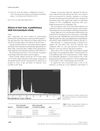 4 citations,
February 2007 in “Journal of the European Academy of Dermatology and Venereology”
4 citations,
February 2007 in “Journal of the European Academy of Dermatology and Venereology” The study suggests silicon might be important for healthy hair, as less silicon was found in people with hair loss.
 3 citations,
September 2018 in “Journal of Biomaterials Science, Polymer Edition”
3 citations,
September 2018 in “Journal of Biomaterials Science, Polymer Edition” Different materials affect the growth of brain cells and fibroblasts, with matrigel being best for brain cell growth.
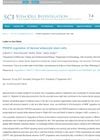 3 citations,
September 2017 in “Stem cell investigation”
3 citations,
September 2017 in “Stem cell investigation” PDGF signaling is crucial for maintaining fat stem cells in the skin, and its level of activation can either preserve these cells or cause fibrosis.
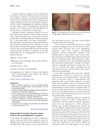 3 citations,
May 2011 in “Journal of the American Academy of Dermatology”
3 citations,
May 2011 in “Journal of the American Academy of Dermatology” A woman's excessive hair growth around a leg ulcer was linked to a treatment with Prostaglandin E1 ointment.
 2 citations,
January 2023 in “Scientific Reports”
2 citations,
January 2023 in “Scientific Reports” HIF-1α is important for hair growth and could be a treatment target for hair loss.
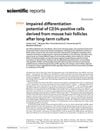 2 citations,
June 2022 in “Scientific reports”
2 citations,
June 2022 in “Scientific reports” Mouse hair follicle stem cells lose their ability to change into different cell types after being grown for a long time.
2 citations,
June 2016 in “International journal of experimental pathology” Human skin has less GDNF and its receptor with age.
 2 citations,
January 1994 in “Journal of S C C J”
2 citations,
January 1994 in “Journal of S C C J” The study concluded that certain hair growth measurements are good indicators of baldness severity and provide a more accurate assessment than subjective grading.
 1 citations,
October 2023 in “Skin research and technology”
1 citations,
October 2023 in “Skin research and technology” LC-OCT is an effective new method for diagnosing classic lichen planopilaris.
 1 citations,
November 2022 in “Research Square (Research Square)”
1 citations,
November 2022 in “Research Square (Research Square)” A protein called HIF-1a helps control hair growth genes and could be targeted to treat hair loss.
 1 citations,
September 2022 in “Journal of dermatological science”
1 citations,
September 2022 in “Journal of dermatological science” Certain vitamins and their derivatives can help hair grow longer by activating specific growth signals.
 1 citations,
June 2022 in “Current drug safety”
1 citations,
June 2022 in “Current drug safety” Topical minoxidil can rarely cause pleural effusion if ingested.
 1 citations,
September 2020 in “Journal of Dermatological Science”
1 citations,
September 2020 in “Journal of Dermatological Science” The gene LRRC15 is more active in balding areas of the scalp compared to non-balding areas.
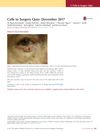 1 citations,
November 2017 in “The journal of investigative dermatology/Journal of investigative dermatology”
1 citations,
November 2017 in “The journal of investigative dermatology/Journal of investigative dermatology” Mohs micrographic surgery is effective for treating basal cell carcinoma on the eyelid, while radiotherapy has higher recurrence rates, and topical vitamin D3 may reduce and delay BCC formation in mice.
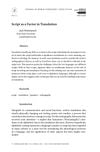 1 citations,
January 2016 in “Journal of world literature”
1 citations,
January 2016 in “Journal of world literature” The conclusion is that the type of writing system used can significantly affect the translation of a text.
1 citations,
July 2015 in “PubMed” Human hair's strength comes from a honeycomb-like structure and macrofibrils.
 1 citations,
December 2014
1 citations,
December 2014 Some drugs have gained approval for new uses, while others like tricyclic antidepressants and aspirin show promise but aren't yet approved for these uses.

Finding functions for unknown GPCRs is hard but key for making new drugs.
 1 citations,
January 2009 in “Elsevier eBooks”
1 citations,
January 2009 in “Elsevier eBooks” The document concludes that a deeper understanding of skin aging and photodamage is needed to create better skin treatments.
 February 2025 in “Animals”
February 2025 in “Animals” Understanding proteins in skin structures like claws and hair is crucial for future research.
 February 2025 in “Skin Appendage Disorders”
February 2025 in “Skin Appendage Disorders” Adrenal tumors can cause hair loss and high testosterone in women.
 May 2024 in “Brain disorders”
May 2024 in “Brain disorders” Agmatine may help reduce seizures linked to hormone changes in female rats.
March 2024 in “International journal of molecular sciences” Meibomian glands are highly specialized and differ significantly from other sebaceous glands in structure and function.
 March 2024 in “The journal of sexual medicine”
March 2024 in “The journal of sexual medicine” Finasteride's negative effects on brain tissue in male rats may be reversible after stopping the drug.
 February 2024 in “Frontiers in physics”
February 2024 in “Frontiers in physics” The new model detects hair clusters more accurately and efficiently, helping with early hair loss treatment and diagnosis.
 December 2023 in “Journal of family medicine and primary care”
December 2023 in “Journal of family medicine and primary care” Hair loss in Saudi Arabia causes a low psychosocial impact, with less effect on those without a family history of hair loss.
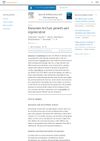 November 2023 in “Journal of Bioscience and Bioengineering”
November 2023 in “Journal of Bioscience and Bioengineering” Exosomes show promise for hair growth but face challenges in standardization and concentration for clinical use.



























